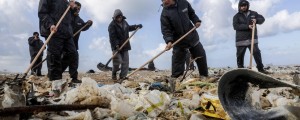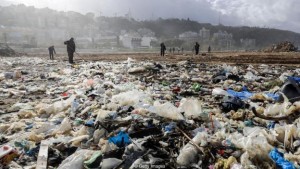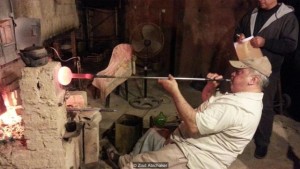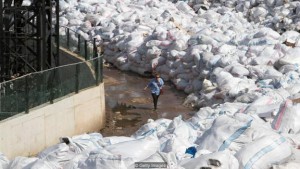[posted by Sophia Smith Galer on BBC, 28 March 2018]
We’re about five metres away from the Mediterranean Sea. To my right, the Zouk Mosbeh power plant pumps out plumes of thick grey smoke into an otherwise bright blue sky. The Jounieh Valley towers behind me over the coastline, a metropolis full of hotels and entertainment venues just outside of Beirut. To my left, I can see some sort of resort in the distance. But all I can smell – and all I can see around me – is rubbish.
This beach has already been cleaned up 16 times, and had been cleaned less than a week before I stepped onto it with Joslin Kehdy, the founder of Recycle Lebanon, which arranges the clean-ups. Plastic is turning up on beaches around the world, but the difference in Lebanon is that rubbish is also being directly dumped into the sea and coastal landfills – spelling disaster for the shoreline’s ecosystem and public health.
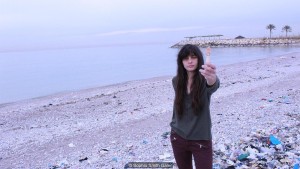 Recycle Lebanon’s Joslin Kehdy says we should all be giving a helping hand towards ridding the country of its waste crisis (Credit: Sophia Smith Galer)
Recycle Lebanon’s Joslin Kehdy says we should all be giving a helping hand towards ridding the country of its waste crisis (Credit: Sophia Smith Galer)
Lebanon’s waste crisis began in 2015 when a huge landfill site closed and government authorities failed to implement a contingency plan in time to replace it; dumping and burning waste on the streets became widespread. The campaign group Human Rights Watch calls it “a national health crisis”.
But it’s also forced environmental organisations to find surprising and much-needed solutions in the face of slow political change – and they’re proving that a country that’s only the size of Connecticut might be one of Earth’s best playgrounds for environmental innovation.
Kehdy tells me that calling her organisation Recycle Lebanon was a pun. It’s not just about introducing recycling initiatives; it’s about forming a new path for a country tackling corruption, which she and other activists believe fuels the waste crisis. The traditionally centralised waste management system in the country has very little sorting capabilities, meaning that the money isn’t in recycling, it’s in generating lots of waste, they argue.
In a list of 180 countries, the 2017 Corruptions Perceptions Index, produced by the NGO Transparency International, ranked Lebanon as the 143rd “least corrupt nation” out of 175 countries – in other words, there are only 32 countries where corruption is worse. According to its website: “Lebanon’s confessional power-sharing arrangement” – that’s the delicate governmental balance it’s forged between the country’s many sects – “fuels patronage networks and clientelism, which undermines further the country’s governance system.”
When the rubbish crisis first started, it stimulated a civil movement; protestors rallied outside the Lebanese government and declared “You Stink!” Gradually this evolved into initiatives like Beirut Madinati, a new political party, and the Waste Management Coalition which is currently campaigning against the government’s proposals to purchase incinerators.
Workers clean the beach of the coastal town of Zouk Mosbeh (Credit: Getty Images)
“The issue with incinerators is that it doesn’t suit our type of waste,” says Kehdy. “Around 70% of our waste is organic. It’s too wet to be processed in incineration.” Secondly – as with most waste management methods – incineration also requires strict sorting at source.
It looks like literally everything is thrown into the sea.
More than 2,000 people have taken part in beach clean-ups with Recycle Lebanon, proving that there’s an appetite for citizens and businesses to get involved. They’re totally zero-waste, too; even the face masks that people wear are re-usable and the filters recyclable. “We set up zero-waste clean-ups with signs so people can learn about the type of waste, the process behind it, where it gets recycled and how they can change the type of products they’re consuming.”
Walking up and down this beach, it’s clear how much general living habits here influence the sort of waste that turns up. We lose count of the small, single-use plastic espresso cups. Having lived in Lebanon, I know how the Lebanese like their coffee – fast and furious. You’ll finish one little cup, throw it into the bin and have someone pour you another. There’s no conversation about re-usable coffee cups that many countries in the West are having now. There are plastic bottles full of water, the tips of hookah pipes, toys and so many single-use plastic bags. I’m also surprised by the amount of medical waste, clothes and astro-turf. It looks like literally everything is thrown into the sea.
A lot of the rejectable waste that Kehdy can’t do much with gets sent to an organisation called Cedar Environmental, run by Ziad Abichaker. As well as providing composting facilities for Lebanon’s organic waste they have built Material Recovery Facilities around the country which recover as much as possible from thrown away materials. Abichaker has even set up glass bottle bins around Beirut and brings the thrown away glass to Sarafand, a small town in South Lebanon where the glass is formed into different shapes by glassblowers, upholding a tradition that’s existed in the country since Phoenician times.
Recycled glass is giving new life to glassblowing in Lebanon, a traditional craft that’s been going since Phoenician times (Credit: Ziad Abichaker)
For the objects that can easily be recycled by people, Kehdy is opening a centre in Beirut called Ecosouk to provide a space where the rubbish from the clean-ups can be sorted and processed. It will be a centralised hub where Beirut’s locals can find out for themselves what they can do – and where they can take their recycling. There will even be an open data source for people to access online and find out what green initiatives are happening in their municipality.
We’re on our way to the Ecosouk when our taxi driver throws some paper out of the window. Kehdy is, to say the least, not best pleased. I ask her how that makes her feel when she’s dedicating her life to changing Lebanese behaviour around sustainability.
“It’s okay, because even if he threw it out the window, and even if he threw it in his bin, it’s going into the sea. Maybe a few years ago we could have been shouting at him, telling him that’s wrong. But now the system is so broken that the government’s dumping the garbage into the sea. How are you going to get someone to not throw it out the window?”
One organisation hoping to prompt behavioural change – or ‘nudging’ – is Recycle Beirut, a company that works with businesses like restaurants and schools as well as local residents. You ring them up, they come and collect your recycling and take it to their factory to sort and process it. They hire Syrian refugees in an attempt to solve both the garbage and refugee crises Lebanon is trying to deal with.
“We believe in doing a social job in addition to an environmental job,” says Sam Kazak, one of the co-founders. “What we are doing is we’re trying to create as many jobs as possible for refugees and for all vulnerable people in general. Most of our workers are Syrian and Palestinian refugees. They don’t have any problem working in this industry.”
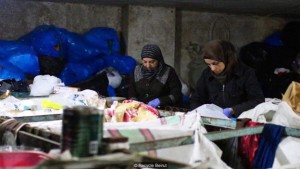 Recycle Beirut hires Syrian refugees to help relieve Lebanon’s humanitarian crisis at the same time as solving its rubbish problem (Credit: Recycle Beirut)
Recycle Beirut hires Syrian refugees to help relieve Lebanon’s humanitarian crisis at the same time as solving its rubbish problem (Credit: Recycle Beirut)
But there’s one problem – refugees often struggle to obtain work permits.
“We try to get work permits for our Syrian drivers but it’s not working. So every time the police stop our trucks they give us a fine and they impound the truck for a few days. And every time the truck gets impounded, many tons of garbage go to the wrong place. Burning, landfilling, dumping in the sea.” He says “these people want to live in garbage” and, similar to Joslin’s Recycle Lebanon pun, I sense that Sam isn’t just talking about the rubbish on the kerb.
When I’m back in Beirut after my trip to Zouk Mosbeh – my trainers unhappily covered in mud and garbage, not sand, from the beach – I head to the American University of Beirut. Since my last trip to Lebanon it’s become smoke-free; anyone reading this who is also accustomed with smoking in the Middle East might be similarly flummoxed as to how a university managed to stop its students and teachers smoking on campus. There are also new recycling bins dotted around the buildings. It’s a rubbish-free haven in a rubbish-filled city.
In the chemistry department I find Dr Najat Saliba who, back in 2015, wrote a letter to the rest of the faculties about solving the waste problem. Everyone replied and, she says, “this is how I became the spearhead for what we call the AUB taskforce to try to do something about what’s happening, or to help the government look into possible solutions”.
When the waste crisis began in 2015 it wasn’t long until a river of rubbish began to snake around Beirut’s suburbs (Credit: Getty Images)
She is the director of the university’s Nature Conservation Center as well as a professor of analytical chemistry and has led the university’s research into Lebanese air quality. Her team has already proved that those who live near garbage piles or open burning sites (or indeed both) are more likely to suffer from respiratory problems. She’s yet to publish data from a new study that connects garbage piles in the streets with higher levels of bacteria and fungi in the air that’s breathed in. Now, she’s concerned that bringing in incinerators will add to the air pollution.
“The problem in Lebanon is that we don’t have labs that are equipped, or can do the quality assurance, and make sure that the fumes that are coming from the incinerators are safe. And I’m sorry to say that based on the practices of what we’ve seen so far we don’t believe that the government can follow up on assuring the quality control is going to be respected and up to the standards that Europeans follow.”
In a workshop that AUB presented about Lebanese air quality, one of Saliba’s colleagues visualised what would happen in one of the areas that the government, hypothetically, would like to place an incinerator. “What we found is that the fume is going to cover the whole of the Beirut area. Most of the residents in Beirut would be affected by the materials released by these incinerators.”
It looks like it will take years for Lebanon to clean up its act. Saliba shows me out of her office and into a nearby lab that analyses air quality. The scientists working hard there are not Lebanese; just like Recycle Beirut’s, the plush campus at AUB is staffed by Syrians and Palestinians.
“I believe in this country,” insists Saliba. “This country will pick up, will change. It has started to change with the Waste Management Coalition who are trying very hard to reverse the clock. It will happen. We will have cleaner air.
“Call me a dreamer! But I would like to dream that way.”

